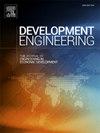Aligning learning objectives and approaches in global engineering graduate programs: Review and recommendations by an interdisciplinary working group
Abstract
Despite decades of global development programming, poverty persists in the low-and-middle-income countries targeted by these efforts. Training approaches to global development must change and the role of engineers in these efforts must evolve to account for structural and systemic barriers to global poverty reduction. Rapid growth in Global Engineering graduate programs in the United States and Canada creates an opportunity to unify efforts between academic institutions and ensure that programs align with the sector's needs as identified by practitioners. To build consensus on how to equip engineering students with the knowledge, skills and attitudes necessary, we convened practitioners, faculty and graduate students for a two-day workshop to establish an agreed-upon Global Engineering body of knowledge. The workshop was informed by a pre-event survey of individual participants and representatives of participating academic institutions with graduate programs in Global Engineering or a related field. Through the workshop breakout sessions and post-event work by the authors, we developed the following priority learning objectives for graduate education in global engineering: Contextual Comprehension and Analysis; Cross-cultural Humility; Global Engineering Ethics; Stakeholder Analysis and Engagement; Complex Systems Analysis; Data Collection and Analysis; Data-driven Decision Making; Applied Engineering Knowledge; Project Design; Project Management; Multidisciplinary Teamwork and Leadership; Communication; Climate Change, Sustainability, and Resilience; Global Health; and Development Economics. Although technical skills are central to preparing the next generation of Global Engineers, transversal and interdisciplinary skills are equally important in equipping students to work across sectors and account for barriers to global development and equity.

 求助内容:
求助内容: 应助结果提醒方式:
应助结果提醒方式:


